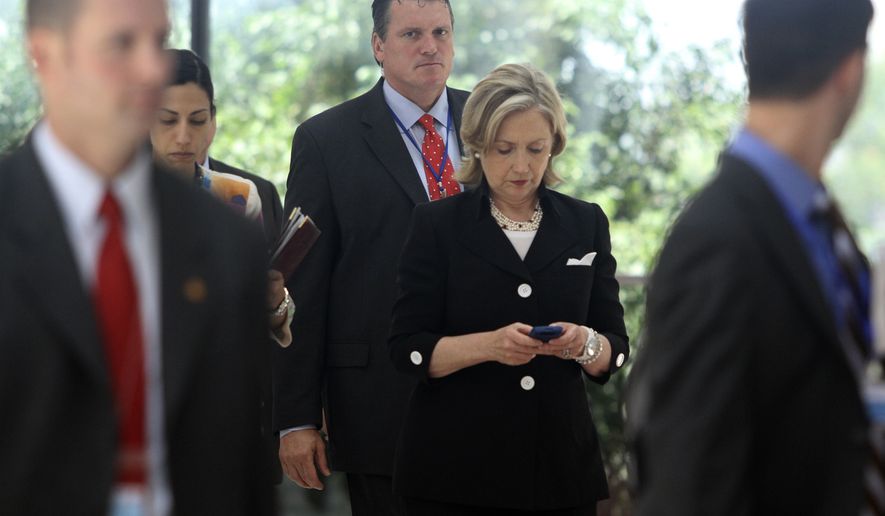A federal judge ordered the State Department Wednesday to request former Secretary Hillary Rodham Clinton not delete any government business emails she may still have, but said he doubts he can force her to do anything.
Judge Reggie B. Walton said since Mrs. Clinton used her own BlackBerry and computer devices, and kept her email server at her home, he doesn’t have authority over the records she created on those.
The ruling is a significant victory for Mrs. Clinton and the Obama administration, which has argued it has already gone above and beyond its duties under the law in trying to recover its records from the former secretary and current presidential candidate.
“I just don’t see what my authority under FOIA would be,” said Judge Walton, referring to the Freedom of Information Act.
Judicial Watch, a conservative public interest law firm that is suing to try to get a look at the tens of thousands of emails Mrs. Clinton deemed personal, said getting the letter from the State Department is an important step because it should be a warning to her not to delete anything she has.
Tom Fitton, the organization’s president, also said the legal conclusions Judge Walton drew as he sat on the bench were preliminary, and predicted that, in the end, courts will rule Mrs. Clinton’s server and email accounts tied to it were government-controlled and should be searched by government employees.
SEE ALSO: State Dept. tells Hillary Clinton to search for more emails
There are more than three dozen separate cases pursuing Mrs. Clinton’s emails, and the situation is already taking a toll on her presidential campaign.
The judges involved are finally beginning to grapple with the big legal questions about Mrs. Clinton’s arrangement.
At stake is whether Mrs. Clinton was the right person to review her own messages and decide which ones are official records to be kept by the government and which are private messages she can delete without having to share them with the public.
The Obama administration argues that Mrs. Clinton was essentially using a private email, and so it’s up to her to go through the messages.
Judicial Watch argues that as the head of an agency, and as someone who exclusively used that system and had a State Department employee service it, the server belongs to the government, and it should be government employees who decide which messages are government records.
Mr. Fitton said they will pursue the case, and the same issues have been raised before other judges in the same courthouse. He predicted that at the end of the litigation, the courts will rule Mrs. Clinton cannot be the final arbiter of her messages.
Mr. Fitton also questioned why the Justice Department was so forcefully defending Mrs. Clinton’s practices on behalf of the State Department when the FBI — a branch of the Justice Department — is conducting its own probe into the server and whether classified information was maintained on it.
Mrs. Clinton has turned over to the State Department more than 30,000 emails she deemed government records from her time in office, but said she discarded another 30,000 she deemed private. The State Department is releasing the public records in batches every month until January, when some 55,000 pages are expected to have been made public in some form.
McClatchy news service reported Tuesday that some of Mrs. Clinton’s emails may still be on the “cloud” storage sites of a firm she hired to back up her server, which means her private emails could still be recovered.
• Stephen Dinan can be reached at sdinan@washingtontimes.com.




Please read our comment policy before commenting.